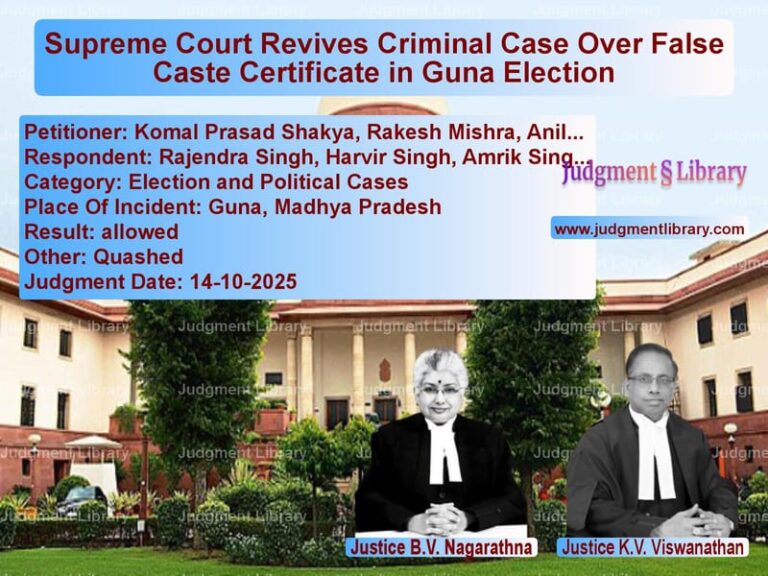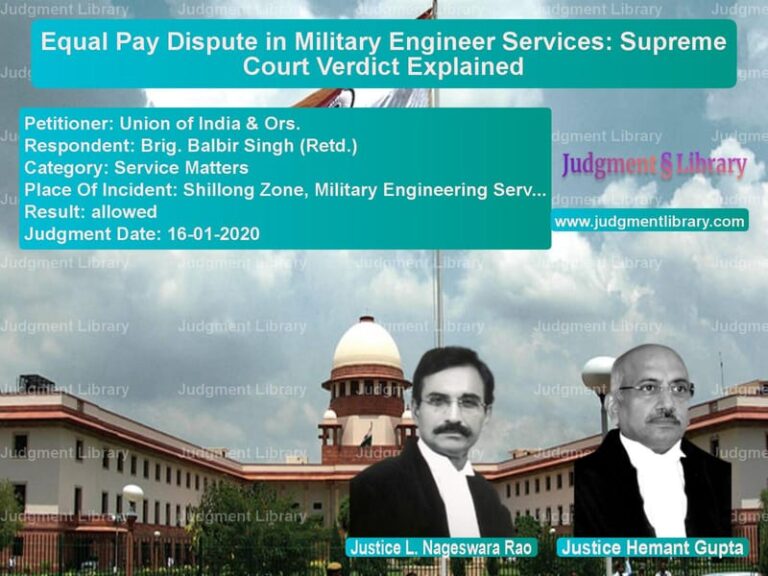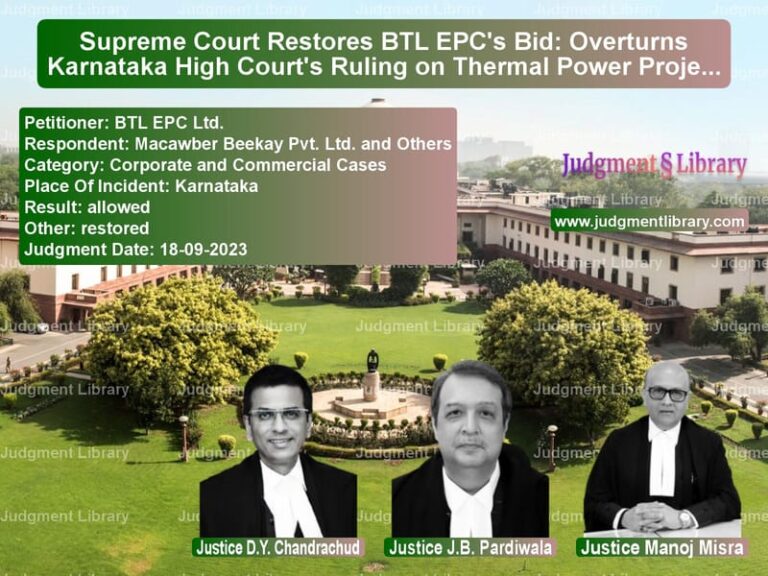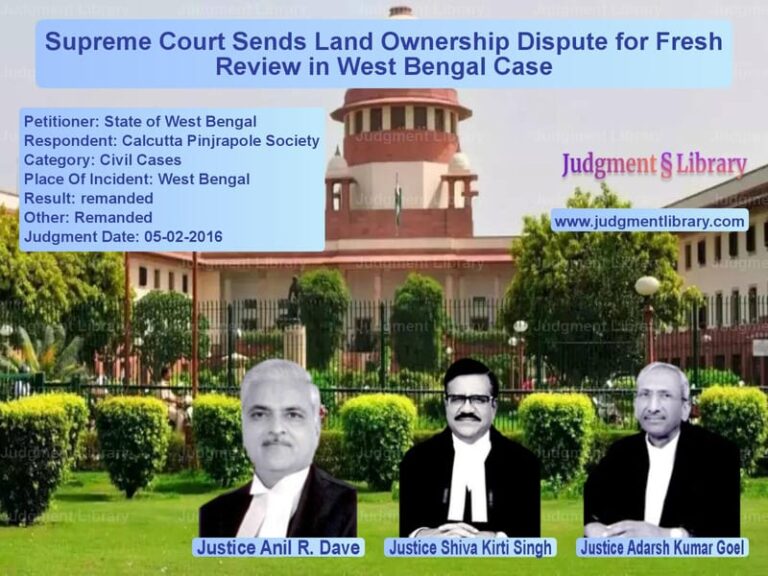Punjab Laboratory Attendant Selection Process: Supreme Court Revises Appointment Criteria
The Supreme Court of India recently delivered a significant ruling in Sukhmander Singh & Ors. v. The State of Punjab & Ors., revisiting the recruitment process for laboratory attendants conducted by the Punjab School Education Board (PSEB). This judgment addresses issues of transparency, merit-based selection, and the legal validity of recruitment criteria used by public institutions for hiring employees. The case centers around the controversy surrounding the irregularities and procedural flaws in the shortlisting process for these positions.
The petitioners challenged the selection process for the post of laboratory attendants, which had resulted in the appointment of candidates without clear and objective criteria. The appellants contested that the recruitment violated established merit principles and lacked sufficient transparency. The judgment clarifies the correct procedures for shortlisting candidates and ensures that merit-based selection is upheld, with particular attention to the legal framework for such appointments.
Background of the Case
The PSEB issued an advertisement on April 27, 2011, for 31 vacancies of laboratory attendants. The eligibility requirements stipulated that applicants must have passed the 10th standard with Science and Punjabi as their subjects. The advertisement led to the submission of 4,752 applications. After conducting a preliminary written test on September 28, 2011, 1,952 candidates were shortlisted based on a determined benchmark score. These candidates were called for an interview stage to determine their suitability for the positions.
Read also: https://judgmentlibrary.com/supreme-court-grants-relief-to-teacher-in-rajasthan-eligibility-dispute/
However, upon completion of the selection process, a dispute arose when several unsuccessful candidates, dissatisfied with their exclusion from the final list published on April 4, 2012, filed writ petitions in the High Court of Punjab & Haryana. They sought a re-examination of the recruitment process, arguing that it lacked transparency, and the shortlisting procedure was arbitrary and flawed.
The initial ruling by the Single Judge of the High Court set aside the entire selection process due to irregularities, including the lack of clear rules governing the shortlisting process. The judge also pointed out the arbitrary awarding of marks for various non-merit factors, such as experience and rural background, which were improperly used to favor certain candidates. However, the matter was appealed, and the Division Bench of the High Court remanded the case back to the Single Judge, directing that the process be reconsidered with greater fairness and transparency.
Legal Proceedings and Arguments
Petitioners’ Arguments
- The recruitment process lacked clarity and transparency, particularly regarding the criteria for shortlisting candidates.
- The PSEB did not provide a merit list based on the written test results, which created significant disparities in the selection.
- The process gave undue weight to subjective criteria like rural area experience and academic qualifications without proper documentation or justifications.
- Many candidates with low marks in the written test were selected for the interview, undermining the merit-based system.
Respondents’ Arguments
- The selection process followed the criteria laid out by the PSEB and included a fair consideration of the candidates’ qualifications and experience.
- The awarding of marks for rural area experience and academic qualifications was legitimate and aligned with the broader goals of inclusivity and fairness in recruitment.
- The interview process, conducted over multiple days, was thorough and ensured that only the most suitable candidates were chosen.
- The respondents also argued that the selection process did not need to be scrapped entirely but could be corrected with minor adjustments.
Supreme Court’s Observations
Justice Hrishikesh Roy, delivering the judgment, emphasized:
“The recruitment process must be transparent, objective, and based on a clear merit list. The arbitrariness in the shortlisting of candidates and the excessive weight given to non-merit factors like rural experience cannot be justified.”
The Court observed that while the written test was conducted in good faith, the failure to provide a proper merit list and the arbitrary inclusion of candidates with low marks in the interview stage raised serious concerns regarding fairness. The Court also stressed that the awarding of 5 marks for candidates from rural areas was not in accordance with the merit-based system required by law.
Further, the Court noted that:
- The PSEB had failed to document the criteria used for shortlisting candidates for interviews, which led to a lack of transparency in the selection process.
- The large number of candidates invited for the interview (63 times the vacancies) was excessive and diluted the merit-based selection process.
- The interview criteria were not adequately balanced, with the interview portion disproportionately affecting the overall merit score of the candidates.
Key Findings and Judgment
- The Court ruled that the entire selection process could not be considered valid due to procedural flaws and lack of transparency.
- However, the Court also acknowledged the fact that some candidates had worked with the PSEB for several years, making it unfair to completely invalidate their selection.
- Thus, the Court upheld the principle of merit-based selection while directing that the PSEB re-conduct the selection process using clearer and more objective criteria, with appropriate documentation.
- The Court also quashed the 5 marks awarded for rural experience and ordered a revision of the evaluation system to ensure that no non-merit factors unduly influenced the selection.
- The judgment was seen as a significant step toward ensuring that recruitment processes in government agencies uphold the principles of fairness, transparency, and meritocracy.
Implications of the Judgment
This ruling has broad implications for recruitment practices in public institutions across India:
- Merit-Based Selection: The judgment reinforces the importance of conducting recruitment processes based solely on merit, with clear, documented criteria.
- Transparency in Recruitment: The ruling ensures that all recruitment processes must be fully transparent and should not be based on subjective factors that cannot be properly justified.
- Equality in Recruitment: The judgment sets a precedent for ensuring that all candidates are assessed fairly and equally, without favoritism toward any particular group.
- Review of Past Selections: The decision highlights the need for transparency in reviewing and rectifying previous recruitment processes that fail to meet legal standards.
Conclusion
The Supreme Court’s ruling in Sukhmander Singh & Ors. v. The State of Punjab & Ors. is a significant victory for fairness and transparency in the recruitment process. By upholding the principles of meritocracy and requiring a revision of the selection process, the Court has ensured that public sector recruitment continues to uphold the rights of all candidates and meets the standards expected under Indian law.
Petitioner Name: Sukhmander Singh & Ors..Respondent Name: The State of Punjab & Ors..Judgment By: Justice Hrishikesh Roy, Justice S.V.N. Bhatti, Justice Sudhanshu Dhulia.Place Of Incident: Punjab, India.Judgment Date: 11-09-2024.
Don’t miss out on the full details! Download the complete judgment in PDF format below and gain valuable insights instantly!
Download Judgment: sukhmander-singh-&-o-vs-the-state-of-punjab-supreme-court-of-india-judgment-dated-11-09-2024.pdf
Directly Download Judgment: Directly download this Judgment
See all petitions in Employment Disputes
See all petitions in Promotion Cases
See all petitions in Workplace Harassment
See all petitions in Termination Cases
See all petitions in Public Sector Employees
See all petitions in Judgment by Hrishikesh Roy
See all petitions in Judgment by S.V.N. Bhatti
See all petitions in Judgment by Sudhanshu Dhulia
See all petitions in allowed
See all petitions in Quashed
See all petitions in supreme court of India judgments September 2024
See all petitions in 2024 judgments
See all posts in Service Matters Category
See all allowed petitions in Service Matters Category
See all Dismissed petitions in Service Matters Category
See all partially allowed petitions in Service Matters Category







